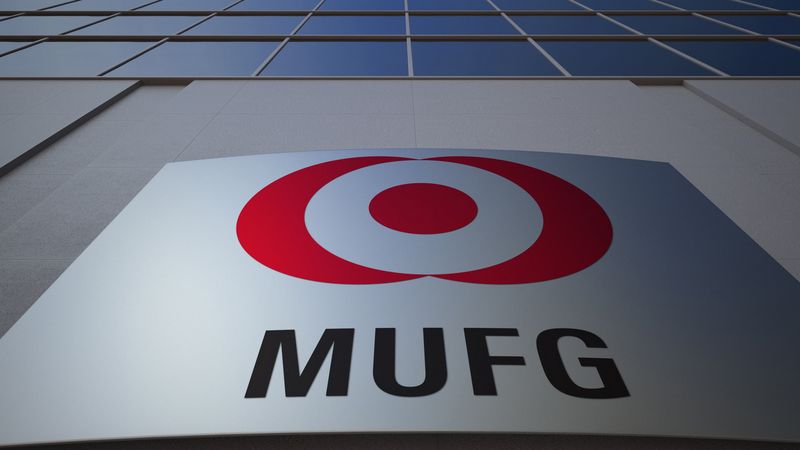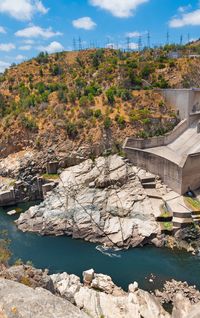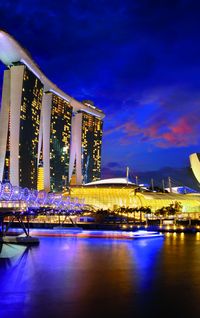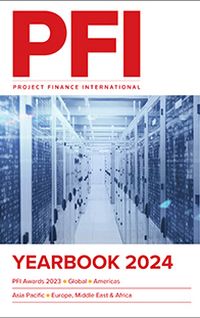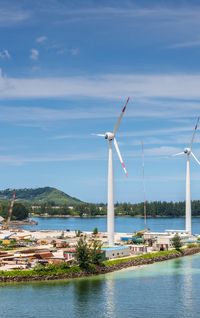Bank of the Year – MUFG
The sheer scale of MUFG’s global activities in the project finance sphere is impressive, as is the list of deals it is involved with – new projects that bring economic and social benefits to the communities they serve.
The bank tops the project finance loan league tables, by a growing margin this year, and is well up in the bond tables, mainly due to its US business. Its deal machine is therefore impressive, with 27 deals closed in the Americas, 14 in Asia-Pacific and 12 in EMEA – across all the sectors – from petchems, to LNG, renewables, storage and onto the new tech sectors.
Therefore, given this flood of activity it might be worth simply mentioning three landmark deals. In the Americas, the bank advised NextDecade on the monster 7mtpa Rio Grande LNG export terminal in Brownsville, Texas. The developer raised US$18.4bn in project debt, not bad for an independent. In addition, it attracted heavyweights GIP, GIC, Mubadala and TotalEnergies into the project company.
In Asia, MUFG advised on what might perhaps have been the most challenging deal of the year – the US$3.6bn Hai Long offshore wind financing in Taiwan. Large-scale project financings of offshore wind projects have become fairly commonplace, if albeit still impressive in scale, but this project was uniquely challenged by the massive losses on a previous deal in Taiwan, Yunlin. In addition, geopolitical tensions did not help. Getting the deal over the line was therefore quite something.
In the EMEA region, the bank has stepped up to underwrite with Standard Chartered the debt financing on the US$1bn Hassyan 2 independent water project. The scheme is sponsored by ACWA Power and global investor EIG and includes a Saudi Exim tranche for the first time.
The bank has a truly global reach and its staffing levels show just how important the Americas market is right now in the global project finance scene. MUFG has 103 professionals in the US, 85 in London, 72 in Tokyo with 50 in Singapore, Hong Kong and Mumbai, plus 27 in Australia.
The bank’s senior management considers project finance a key global franchise and the firm has committed significant resources to the business. It offers a full suite of services to project finance investors and corporate clients alike, allowing them to successfully raise, move and hedge money under a single global platform.
The bank is playing an important role in assisting the energy transition – rather than sending out numerous press releases about not doing this, that and the other, and expanding its green lending by 100x, it has been publishing interesting thought leadership articles such as the one printed in this year’s Yearbook. The article covers the potential and practical use of ammonia in power co-firing in the short and medium term. Transition is the word.
The bank has a regionalised structure with no overall global project finance head. In the Americas, the team is led by Erik Codrington, in Asia, by Shivanan Sivarajah with Paul Martin head in Australia, and in EMEA, Philip Hall. Former project finance heads in New York and London keep an eye on things as Americas and EMEA heads of global corporate and investment banking respectively, Jon Lindenberg and Phil Roberts.
Adviser of the Year – Societe Generale
Societe Generale has put together a suite of advisory mandates this year across both the more traditional project financing deals and the cutting-edge new tech type deals – from petchem schemes to large-scale offshore wind farms, onto battery storage and into the new green manufacturing sectors.
Plenty of these deals actually reached financial close this year, an important judge of success. But there are plenty of new style mandates already awarded for the 2024 pipeline that will require an expanding set of advisory skills. Long gone are the days when standardisation of project documents was the watchword. These days, financings are becoming ever more complex and Societe Generale has been adapting.
The advisory function within the bank is embedded within the global sector teams. Sector knowledge is therefore shared and at the same time expanded within these teams – whether a mandate is arranging or advising. Olivier Messe leads the global energy team, Herve Le Corre leads the global infrastructure team and Lenang Trenaux leads the global mining, metals and industries team.
Among mega deals that got the year off to a good start was the €4.6bn debt raised for the twin Ocean Winds offshore deals in France – Noirmoutier and Dieppe Le Treport. These were long-standing mandates.
H2 Green Steel is long-standing too but much more complex. It is the first green steel plant financing, a €5bn deal involving both debt and equity financing for the Swedish project, which was established by those who set up the Northvolt gigafactory battery plant.
Societe Generale has moved into the gigafactory arena and advised on the €870m AESC EV battery plant project financing that closed in October and the larger €1.5bn Verkor EV battery debt financing that is due to sign soon. Both plants are in France. Following on, the bank had mandates for the GravitHy hydrogen based direct iron reduction plant in France and a gigafactory in Turkey. A lithium refinery scheme is in the works in the UK for Trafigura-linked Green Lithium Refining.
The bank has been active in piloting the new technologies now at the forefront of the energy transition. It has already been sounding the market out about the Vertex hydrogen scheme in the UK and the two linked financings for Teesside carbon capture projects – the first for carbon capture infrastructure and the second a gas fired power plant.
It has two mega offshore wind financing mandates in the US that should now progress into 2024 and one of the first large-scale floating offshore mandates for Cerulean Winds in the UK.
The bank advised on two of the large-scale petrochemical schemes this year – the US$4.5bn Ras Laffan financing for Qatar Energy and Chevron Phillips Chemical and the Karratha urea scheme in Western Australia. The urea scheme in particular suffered from various ups and downs before getting to financial close. Two deals have been put together for Cheniere LNG in the US.
During the year SG advised on a €4.6bn non-recourse financing for the Vodafone/Altice OXG Glasfaser joint venture to back its fibre build-out in Germany. And it was involved in one of the larger battery storage financings in Australia, the A$290m Rangebank deal.
Debt Investor of the Year – Infranity
French institutional investor Infranity has pushed forwards more than €2bn of debt funding for green infrastructure in 2023 alone, barely five years after its launch. The firm has managed to build a €8.8bn pipeline of assets under management in half a decade. It is climbing up thanks to a combined approach of playing a lot and playing it safe. The firm is still wrapping up some commitments from investors and may finish the year topping €9bn of AUM, which is above its ambitious 20% year-on-year growth target – the parameter against which growth is measured remains undisclosed, however.
Infranity is part of the Generali Investments ecosystem of asset management firms. It was founded in 2018 by ex-Generali managing partners Philippe Benaroya, Alban de La Selle and Gilles Lengaigne. Benaroya currently acts as Infranity’s CEO, managing the company shoulder-to-shoulder with de La Selle as CIO and Lengaigne as managing partner and head of origination and corporate development. The trio lead a team of nearly 50 people, mainly based in Paris.
In summer 2023, Infranity successfully closed its third infrastructure debt fund at €1.6bn with a slight degree of oversubscription against its €1.5bn target. The firm has two impact funds currently in the market and both will be closing by the end of the year, with a potential of some more cash being injected in them before the year is out. Infranity has just launched a new debt fundraising that has already attracted €425m of commitments and that will target investment grade, Triple B enterprises. The firm has so far been mainly active in the mid-market, sub-investment grade space with an approach to lend to borrowers that carry some level of risk on their balance sheets but invest in assets that are low to very low risk.
Some landmark transactions by the company this year have included acting as MLA alongside Schroders on the €600m debt raising by Bruc to back part of its 8.5GW portfolio in Spain, co-funding Sonnedix’s Europe-wide sustainability-linked financing and refinancing facilities in March, fully subscribing to Planea Energia’s €68m bond issuance financing 141MW of solar plants in Spain, underwriting German developer MaxSolar’s €410m debt raising for PV and batteries, and signing a bilateral debt agreement with Peridot Solar in Italy for €120m of PV funding.
Infranity has managed to score big and safe in a year of uncertainty and continuous disruption, due to Generali’s backing, of course, and to the fact that it has not found itself in a position to scale down its ticket sizes because it has not struggled with poor liquidity or with low co-lenders’ interest in its focus sectors. The company tries to stay away from risky credit and underwrites infrastructure debt deals on zero-loss targets. All of its funds are dark green Article 9, focusing on sustainable investment objectives, in an investment space where many funds have been moving to light green ESG Article 8 characteristics. Keeping Article 9 principles may have strengthened the fund in terms of green credentials and credibility.
A stable base of clients and an approach to earn trust among the subscribers of deals it underwrites have given Infranity a further step ahead in times of financial headwinds. The firm’s credit approach favours mid and high single digits over double digits – it could source infra debt in the double digits, but it would have to stay in junior tranches and Infranity shows a commitment to stay away from those. On the equity side, some repricing should soon be reaching the equity world as there is more IRR ticking up, even in the sub-investment grade space Infranity has been investing in.
Generali has been quietly active in acquiring renewables equity assets via its Sosteneo Infrastructure Partners platform. In the last months it has acquired a 50% stake in a 163MW solar project in Milan from European Energy. It bought the 249MW/373.5MWh Sheaf Energy and 99.98MW Richborough battery schemes in Kent, UK, from Pacific Green Technologies.
Sponsor of the Year – Ocean Winds
Engie and EDPR have more in common than their individual stellar performances this year – their 50:50 joint venture Ocean Winds is PFI’s 2023 Sponsor of the Year. When it comes to offshore wind, the French and Portuguese peers operate as a single company with a dedicated team that has a global business development reach, allowing both Engie and EDPR to grow their offshore wind assets more rapidly. Ocean Winds targets markets in Europe, the US and selected Asian countries.
The JV’s 2023 successes have included the 1GW Les Eoliennes en Mer Services (LEMS) bottom-fixed dual wind farm project in France, in partnership with Sumitomo and Caisse des Depots; and the 880MW Moray West project in the UK. The 1GW French scheme includes the Dieppe Le Treport and Noirmoutier projects of 496MW each, both overseen by Mickael Jozefowicz acting as CFO, seconded from Engie’s in-house project financing advisory AI&FA. Moray West is managed by Nicolas Lescal, sourced for the project from his previous role as business development manager at Engie.
Ocean Winds’ headquarters are in Madrid with regional offices in the areas where the JV develops offshore projects. The OW senior management team includes both Engie and EDPR representatives and the JV is led by managing directors seconded from Engie and EDPR on a rotation principle, with Bautista Rodriguez Sanchez currently acting as CEO since 2021, on secondment as CTO of EDPR. Ex-Engie Matteo Maino acts as CFO for Ocean Winds. The structured and corporate finance team is led by Ernesto Vargas Espinosa, ex-EDPR.
Engie often acts as financial adviser to the JV through its AI&FA internal finance team, contributing from its large project finance capabilities to provide dedicated structuring guidance and conduct the process for lender selection, negotiation of loan documentation and coordinate lenders’ due diligence process. Engie’s AI&FA entire team is led by Philippe Lekane and Daan Van Hoyweghen, who leads the renewables financing practice.
Engie’s AI&FA practice, combined with the ability of both Engie and EDPR to tap into the resources of relationship banks that trust them, has enabled Ocean Winds to secure convenient offtakes and to access multibillion project financing packages. A timely example of that are this year’s Moray West and Dieppe Le Treport/Noirmoutier project financings, for which nearly €7bn of project debt was mobilised from more than 15 lenders at a time of peaking costs for offshore wind and serious unsolved issues across the supply chain.
Ocean Winds was established as a JV at the end of 2019 and its pipeline is the result of Engie and EDPR’s combined offshore wind project pipelines. The JV started with targets of 1.5GW assets under construction and 4GW under development. OW’s portfolio now reaches 16.6GW of gross capacity, nearly tripling since its creation. It currently operates 1.5GW offshore wind capacity globally, has 1.9GW of assets under construction and 13.2GW under development. OW is set on reaching its target of 5GW–7GW operational assets and taking up to 10GW under advanced development by 2025. Combining the expertise and relationships of both Engie and EDPR, Ocean Winds has all the necessary features to emerge as an offshore wind leader in the rough seas the industry is set to sail through for a while.
Law Firm of the Year – White & Case
White & Case has been working on innovative, first-to-market energy transition projects worldwide – from NEOM’s US$8.4bn largest-in-the-world green hydrogen financing in Saudi Arabia, to Perdaman’s US$4.2bn Karratha Urea project in Western Australia, to Ridgewood and IDE’s City of Fort Lauderdale water treatment PPP deal. There have been a number of first-of-a-kind financing structures and landmark construction and offtake arrangements to make these projects bankable for sponsors and attractive to lenders.
White & Case’s Project Development & Finance practice has 95 partners and 324 lawyers. The practice is led by Elena Millerman in New York. The EMEA Energy, Infrastructure, Project and Asset Finance Group is led by Michael Watson in London, who is also co-head of the global energy group and a member of the law firm’s ESG core team. The London team counts 17 partners, which is the largest of any law firm’s project practice in the UK. The Americas energy and infra practice is headed by Christopher Richardson from the Houston office, while Joanne Draper acts as regional head for Asia-Pacific in Melbourne.
The practice led the global law firm chart in PFI’s legal report advising on a total of 33 deals with 17 on the sponsors’ and 16 on the lenders’ side. It has also made it to Number 1 law firm for number of deals in Asia-Pacific with 15 advisory closes, eight on lenders’ and seven on sponsors’ sides. It is number four in EMEA and number six in the Americas, with 11 deals in EMEA and seven in the Americas.
White & Case pushed forward a global uptick in battery related investments and projects. These ranged from development, construction and financing of gigafactories for the production of EV batteries – with successful mandates secured both in Europe and North America – to battery storage projects, including some of the largest battery projects in Australia, the first-in-country battery storage projects in the Middle East and several projects across Europe. Digital infrastructure and data centres brought in significant revenues in Europe, with the Glasfaser Nordwest expansion deal in Germany and Morgan Stanley Infrastructure Partner’s acquisition of UltraEdge in France. The offshore wind advisory business grew globally, confirming the firm’s presence in Europe and expanding it to the offshore wind advisory space in Asia – stepping into offshore wind mandates in Vietnam, South Korea, Japan and Taiwan.
With all due respect to renewables, the firm’s projects practice has also advised on some very large refinery projects in 2023 – it represented QatarEnergy and Chevron’s joint venture on the US$4.4bn financing for the development of the Ras Laffan petchem project in Qatar; it assisted Lotte corporation on the development and financing of a US$2.4bn naphtha cracker project in the Banten province of Indonesia; it assisted Pertamina on the US$3.1bn financing for the Balikpapan refinery development master plan in Indonesia; and, last but not least, it worked on the largest greenfield energy equity and debt financing in US history, the Mubadala/NextDecade/GIP/GIC/TotalEnergies Rio Grande LNG export facility.
The volatility of global markets and the fact that a lot of work involves parties from and in emerging markets consistently presents challenges. Some of the highlights for 2023 have included changes in the financing products and access to capital because of interest rate increases. The topic of energy security seems to have presented both challenges and opportunities: securing financing for traditional sources of energy has become challenging, with ESG and net-zero targets dominating the agendas of more and more energy clients.
There has, of course, been a drop in infrastructure M&A activity in the market globally. White & Case established itself as a global leader in the past 12 months by proving its ability to navigate the changing energy regulatory landscape and ensure its clients could still meet their objectives and future-proof their businesses. The firm’s success is proven by the amount and strength of the deals its partners have been involved in.
Investor Deal of the Year – Zenobe
UK based Zenobe has been at the forefront of developing green sustainable assets across the world since it was established in 2017 by financier Nicholas Beatty, network infrastructure specialist James Basden and EV infrastructure specialist Steven Meersman. This year the company secured £870m in new equity from KKR and Infracapital to take forward its development plans into the next four or five years in Europe, Australia and New Zealand and North America.
The company focuses on two business sectors – battery storage and bus fleet electrification. Significant debt packages have been raised for both businesses in the UK and they are now being expanded elsewhere as the business grows.
Under the new shareholding structure, KKR and Infracapital will own 90% of the company on a 50:50 basis in return for KKR investing £600m and Infracapital, an existing shareholder, £270m in addition to its existing £150m. Infracapital bought a number of co-investors into the equity raising, including Mubadala and AMG's Pantheon.
JERA, which is developing battery projects with Zenobe in the US and has invested £20m, now has 5%, and management the rest. Tiger Infrastructure and friends and family of the co-founders, who put in £20m and £25m, respectively, backing Zenobe when it was founded, have exited.
The new shareholding relationships will help growth. With KKR on board, a major expansion is planned in North America. It is developing US battery storage schemes on JERA sites with the Texan and New England markets looking attractive. On the bus fleet side, client Mobico, formerly National Express, has 30,000 school buses across the US that could be electrified.
Zenobe has been active since its inception raising debt to back its developments. It is starting to talk to banks about expanding its two UK project financings backing its battery and EV bus businesses. In February, it secured £235m to fund two battery projects – Blackhillock, a 200MW/400MWh site near Inverness that will go live in the summer of 2024, and Kilmarnock South, a 200MW/400MWh project near Glasgow that will go live shortly thereafter. The deal was structured by NatWest, which bought in CIBC, Rabobank, Santander and Siemens Bank.
The deal includes a £400m accordion, a commitment that now needs to be exercised to fund completion of the projects and some new schemes. The debt/equity split was above 50% and pricing is around the 200bp level. The deal is backed by contracted revenues on 40% of the revenue stack. The loan tenor is 10 years but the deal is sized on a 14-year notional tenor with a balloon payment at the end of year 10. The tenor is linked to the 15-year battery life. Zenobe has said it will invest £750m in battery projects in Scotland to develop 1GW of storage capacity by 2026.
In February 2022, Zenobe secured a £241m multi-source debt structure to refinance debt on its fleet of 290 electric buses and to expand its business, with contracts backing 335 new buses already signed. The debt is split into a £116m 15-year term loan to refinance the existing contracts and a five-year £100m capex facility to back the build-out of new contracts. There is also a £15m working capital facility and a £10m debt service reserve account.
With more EV bus fleet wins, the company is looking to expand the facility, particularly the capex element – which acts as a revolving facility to fund new projects. NatWest advised on the deal, Aviva and Scottish Widows, owned by Lloyds, are the institutional investors on the 15-year loan alongside NatWest, Siemens and Societe Generale. The three banks plus Lloyds, MUFG and Santander are in the capex facility.
Zenobe has raised project debt in Australia and New Zealand – a A$24.5m (US$15.6m) 12-year fully amortising non-recourse senior loan from federal lender Clean Energy Finance Corp for its bus project in Sydney with Transgrid, and a NZ$20m (US$12.9m) loan from government lender New Zealand Green Investment Finance for its bus fleet in New Zealand.
Green Deal of the Year – ACWA Power
ACWA Power financed a total of 7.1GW of solar projects in Saudi Arabia this year, first in a 2.6GW deal, Shuaibah 1 and 2, which was billed as the biggest single global solar financing at the time. But this was followed by a monster 4.5GW deal, PIF 3, at year-end. The first deal was complex whereas the second was more vanilla, even given its size.
On Shuaibah 1 and 2 the financing was complicated by the fact that the deal combines the 600MW Al Faisaliah scheme, won in the REPDO round two bidding programme at a world record low tariff of US$0.0104/kWh, and the 2GW Shuaibah 2 scheme next door, which was bilaterally negotiated with the Public Investment Fund (PIF) with a higher tariff.
To keep the world record tariff, the deals were combined and the two projects cross-collateralised. There are separate power purchase agreements (PPAs) and special purpose vehicles (SPVs) for each project and the financing is conducted at a holdco level above the two, with the SPVs leasing the projects from the holdco. The tenor on the PPAs has been lengthened to 35 years post commercial operating date (COD).
The debt includes a SR4.4bn-equivalent US dollar commercial facility from a consortium of local, regional and international banks including Bank Saudi Fransi, First Abu Dhabi Bank, Mizuho, Riyad Bank, Saudi National Bank, Standard Chartered and Saudi Investment Bank, plus a SR1.7bn riyal-denominated loan from the National Development Fund on behalf of the National Infrastructure Fund. The commercial soft mini-perm loan pricing starts at 135bp and the overall tenor is 30 years plus.
The equity is being provided by a consortium of ACWA Power, the Saudi Public Investment Fund's electricity holding company Badeel, and Saudi Aramco, with ACWA Power holding a 35% equity stake. The EPC contractor on the scheme is China Energy Engineering Corporation.
DLA Piper advised the lenders and Covington Burling advised the sponsors. SMBC, Eversheds Sutherland and White & Case advised the procurer on the deal, Saudi Power Procurement Company (SPPC).
ACWA Power then financed the US$3.4bn PIF3 deal, bilaterally negotiated with the PIF. The scheme is split in three – 2GW Ar Rass 2, 1.125GW Saad 2 and 1.425GW Al Kahfah – and has three project companies. Debt raised is US$2.3bn via a soft mini-perm priced around the 140bp mark. The deal is backed by five local banks – Saudi Franwi, Riyad, Saudi Awwal Bank, Saudi National Bank, and Saudi Investment Bank – and three internationals – HSBC, Mizuho and Standard Chartered.
ACWA Power will hold 50.1% of the project company and Badeel will have 49.9%. DLA Piper advised the lenders and Covington Burling advised the sponsors. ACWA is now working on the 5.5GW PIF 4 deal, and the fifth deal is said to be even bigger at 12GW. The Kingdom has raised its 2030 solar generation target to 130GW from 58GW.
ACWA has had a very active 2023, raising US$15.5bn in nine projects across Saudi Arabia, Egypt and Azerbaijan, and bringing in China Southern Power Grid and EIG as equity investors.
The management succession was resolved with Marco Arcelli coming in as chief executive officer (CEO) in March from Czech Republic-based EPH Group. He replaced Paddy Padmanathan, the CEO since 2006. Thomas Brostrom joined in October as chief investment and development officer replacing Clive Turton. Brostrom this summer left Shell in London, where he was senior vice-president for Shell Energy in Europe and Asia, overseeing offshore wind globally. He had joined Shell from Orsted. Atanu Das is responsible for raising the project financings on the assets. ACWA is quoted on the Saudi stock exchange and is 50% owned by PIF.
Digital Deal of the Year – EdgeConneX
Virginia-headquartered edge-network data centre provider EdgeConneX completed a €2.645bn sustainability-linked refinancing and upsizing of its European DCs. Oversubscription means the deal was upsized from the €2.4bn originally targeted.
The year saw EdgeConneX active in deals outside of Europe. Its 50:50 joint venture with Adani Enterprises, AdaniConneX, raised a US$213m seven-year project finance senior facility for two data centres with 67MW combined capacity in India. And EdgeConneX’s wholly-owned Indonesian subsidiary, Graha Teknologi Nusantara, raised US$403.8m in a sustainability-linked loan.
In the European deal, existing project-level debt of about €1.3bn was consolidated and refinanced under the facility. It is structured across three tranches with a term loan, capex and revolving credit facilities and refinances EdgeConneX’s DCs across seven European jurisdictions while offering new capex for future development.
The capex facility can be used for greenfield construction as well as permitted acquisitions and joint ventures. Five banks underwrote the deal including ABN AMRO, ING, Natixis, Societe Generale and SMBC.
Syndication of the debt saw it sold to Edmund de Rothschild’s BRIDGE, Generali-backed Infranity, Generali Global Infrastructure, Generali, IST3 Investment, Feronia SICAV-RAIF, NAB, NIBC, BNP Paribas Asset Management, Credit Agricole CIB, Sun Life, Bank Sinopac, Canada Life, Mizuho, Bank of China, Shinhan Bank, BBVA, Kookmin Bank, NatWest, CIC, Siemens Bank, KfW IPEX and Standard Chartered.
The seven-year deal is split into a €1.57bn term loan and two multi-currency capex facilities of €750m and €250m, plus a €75m revolver. The term loan has a margin starting at 210bp, stepping up over time to 305bp – subject to the portfolio meeting certain sustainability metrics that can raise or lower pricing by 5bp. The commitment fee is 35% of the margin, or approximately 74bp, and the upfront fee is 150bp.
The debt price adjustment mechanism is linked to the portfolio’s performance against certain ESG metrics. Key performance indicators include the weighted-average power usage effectiveness, the level of renewable electricity purchased compared with the overall level of electricity used, and the ratio of operational DCs with zero-waste-to-landfill certification.
EdgeConneX’s European DCs are in Dublin, Amsterdam, Brussels, Munich, Barcelona and Warsaw. Over 90% of the portfolio is contracted on a long-term basis with blue-chip tenants. EdgeConneX’s refinancing was supported by legal advice from Allen & Overy and financial advice from Bishopsfield Capital Partners. The lenders were supported by law firm Clifford Chance.
EdgeConneX was co-founded in 2013 by CEO Randy Brouckman and COO Edmund Wilson. Joe Harar is CFO and Eelco Holst is vice-president of corporate finance. Since its founding the company has built more than 50 DCs throughout North America, Europe, Asia-Pacific and South America. EdgeConneX has more than 500MW in development and operation globally. The company is backed by Swedish private equity company EQT’s Infrastructure IV fund, which agreed in August 2020 to acquire EdgeConneX from Providence Equity Partners.
In India, the company's project financing backs two under-construction projects, the 17MW Stage One of the Chennai 1 campus in Tamil Nadu and the 50MW Noida campus. Lenders on the deal included ING, Mizuho, MUFG, Natixis, SMBC and Standard Chartered. All banks had equal MLA status.
In Indonesia, its package will finance development of two data centres in Jakarta and was raised via ING, Natixis, SMBC and MUFG, which acted as the account bank, facility agent, security agent and hedging bank. The transaction closed in September. It has been described as the first sustainability-linked loan for data centres in Indonesia. The loans use a KPI framework that complies with SLL principles published by the Loan Market Association.
To see the digital version of this report, please click here.
To purchase printed copies or a PDF of this report, please email leonie.welss@lseg.com
